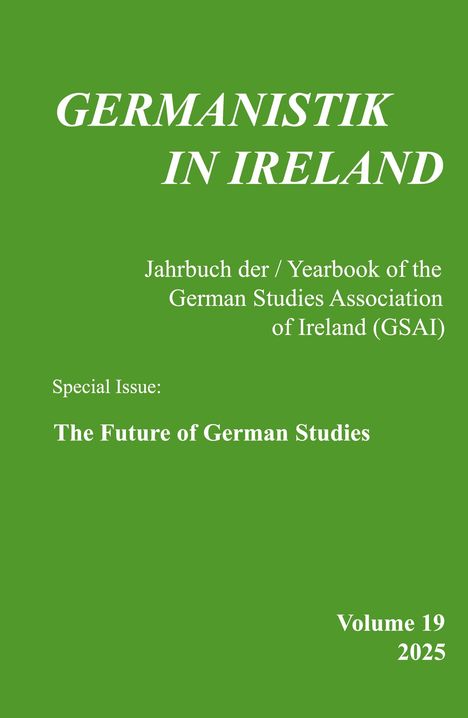The Future of German Studies, Kartoniert / Broschiert
The Future of German Studies
(soweit verfügbar beim Lieferanten)
- Herausgeber:
- Tina-Karen Pusse, Olga Springer
- Verlag:
- Hartung-Gorre, 11/2025
- Einband:
- Kartoniert / Broschiert
- Sprache:
- Englisch
- ISBN-13:
- 9783866288478
- Artikelnummer:
- 12528504
- Umfang:
- 128 Seiten
- Gewicht:
- 218 g
- Maße:
- 230 x 150 mm
- Stärke:
- 9 mm
- Erscheinungstermin:
- 3.11.2025
- Hinweis
-
Achtung: Artikel ist nicht in deutscher Sprache!
Klappentext
Across Europe and North America, language and literature departments are contracting at a pace that would have been unthinkable two decades ago. Courses are frozen, programmes merged or dissolved, and the study of specific languages, German not least among them, is too often dismissed as a dispensable ornament of the past. Beneath this development lies a familiar, and deeply flawed, assumption: that in an age of translation driven by large language models and frictionless global communication, the value of linguistic competence is decreasing. If we can converse through our devices, why still learn to speak and think in another tongue? As we know, language learning is about much more than communication. It is about metacognition, about understanding how thought takes shape in and through language. But even more fundamentally, it forces us to ask what communication itself really means. Generative AI /Large language models may allow us to make ourselves understood at a basic level, but true communication is not about transmission alone. At its core lies understanding others - their assumptions, histories, and emotional registers - and developing the sensibility to perceive meaning within a specific cultural and linguistic horizon. Machines can translate words, but they cannot translate worlds. The work of learning a language remains, at its core, an ethical practice: an act of attentiveness to otherness. In addition, the future of Large Language Models relies on constant new high quality human input and human feedback loops evaluating, for example, the quality of translations. Without this, it has been shown, the quality of their outputs deteriorates quickly. There is also the matter of resilience. The assumption that so-called Artificial Intelligence will always be available, affordable, and free from ideological inflections (attributes already debatable in many of its current incarnations) is a form of collective wishful thinking. What happens when access to such tools is increasingly monetized or politically restricted? What happens in times of war, electricity outages, censorship, or digital collapse? Linguistic self-sufficiency, our ability to read, think, and communicate across cultures without mediation, may soon be more than a scholarly virtue. It may be a civic necessity.
Biografie (Tina-Karen Pusse)
Tina-Karen Pusse, geb. 1973. Studium der Germanistik und Philosophie in Freiburg i.Br. und der Komparatistik und Philosophie in Paris, Promotion 2003, derzeit Assistentin am Lehrstuhl für Allgemeine Literaturwissenschaft und Medientheorie am Institut für deutsche Sprache und Literatur in Köln und Redakteurin der Freiburger Frauenstudien. Veröffentlichungen zu Kafka, Sacher-Masoch und Judith Butler.Anmerkungen:
Bitte beachten Sie, dass auch wir der Preisbindung unterliegen und kurzfristige Preiserhöhungen oder -senkungen an Sie weitergeben müssen.

